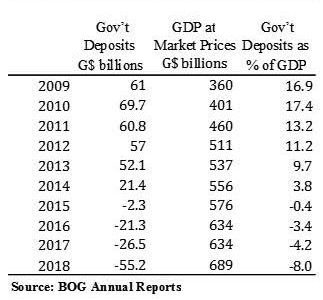The underground economy in Guyana: What is the composition?
The informal or underground economy has been the source of tremendous speculation and political controversy.
The informal or underground economy has been the source of tremendous speculation and political controversy.
The previous column – “Government deposits at the BoG and some MMT-like themes”– makes several points.

In recent years, there have been notable and often heated discussions over the Consolidated Fund (CF).
The previous column utilized data from the 2016 Latin American Public Opinion Project (LAPOP) survey to gauge how people voted in the 2015 general election.
Just before the May 2015 general election (SN May 6, 2015), I wrote a Development Watch column asking whether the PPP/C will be able to suck cane and blow whistle.
Several weeks ago I started a series of columns on the ethnic security dilemmas (ESDs).
The state of wealth and income distribution in a society is very important for social consensus and cohesion.
In my reading of Guyanese history and political economy, the issue of land distribution has psychic and perceived economic value for all Guyanese.
In this column, I will continue to explore the rationale of the PNCR’s economic policy since March, 2015.
As promised last week, I will do a short review of the book by Minister Carl B.
By now everyone is aware the Chief Justice ruled that the no-confidence vote stands.

In my previous two columns before the one last week, “Dr.
I should be writing about the serious problem of inequality and to what extent it has an ethnic dimension, as I promised last week.
I argued in the previous column that the no-confidence vote and the government’s response to it – flouting the very constitution President Granger and his party revere – indicate another chapter in the long-term and persistent ethnic conflict playing out in Guyana.
It is no surprise to me that the legitimacy of the no-confidence vote is being challenged, led largely by the PNC section of APNU.

I hope the Green Paper on the proposed Sovereign Wealth Fund (SWF) is a work in progress.

Professor Clive Thomas stimulated much discussion last week when he proposed the idea of a US$5000 per year cash transfer to Guyanese families.

I was planning to write this week about the recent parliamentary debates over the role of the Bank of Guyana in the financial system and foreign exchange market.

Guyanese on social media were euphoric last week when it was announced that the country now has at least 4 billion barrels of recoverable reserves.

In the previous column on the topic of the “trade war,” I outlined some of the consensus views regarding the potential impact.
The ePaper edition, on the Web & in stores for Android, iPhone & iPad.
Included free with your web subscription. Learn more.